英语文学欣赏(周芳主编)思维导图
《英文疑难详解续篇》读书笔记思维导图
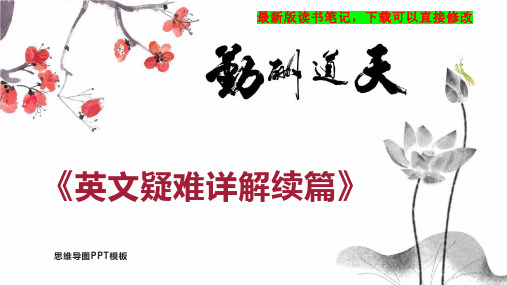
Ⅲ 形容词、副词
01
20.虚设 的否定字
02
21.alrea dy和yet
04
23.few、 a few, little...
06
25.ever 和once的 用法
03
22.Indir ect Negation
05
24.right bank of the...
26.a many
1
(men)和
many ...
Ⅰ 名词
01
1.compan y的含义及 用法
02
2.废物的 英文
03
3.commit ment的译 法
04
4.rain、 a rain、 the ra...
06
6.honou rs作形容 词
05
5.大数字 的名称
7.固有名词的普通 化
8.morning、 afternoon、...
9.information等 不用复数
02
90.tagquestion 的动词和 主...
03
91.美国 的zip code
04
92.新加 坡的本地英 文
06
94.It s up to you的译法
05
93.主句 中有 decide等 字时附句用 假...
01
94.It's up to you的译法
02
95.英美 学校用语不 同
03
96.同格 的属格
01
138.英文 分音法
02
139.同化 作用
03
140.动静 异音
04
141.滋生 字重音的转 变
06
143.后缀 的轻重音
05
英语学习文学作品赏析讲座课件
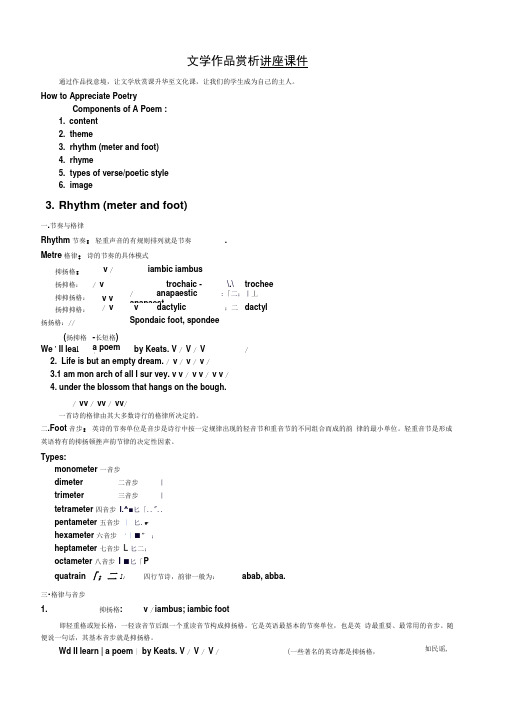
文学作品赏析讲座课件通过作品找意境,让文学欣赏课升华至文化课,让我们的学生成为自己的主人。
How to Appreciate PoetryComponents of A Poem :1. content2. theme3. rhythm (meter and foot)4. rhyme5. types of verse/poetic style6. image3. Rhythm (meter and foot)一.节奏与格律Rhythm节奏:轻重声音的有规则排列就是节奏.Metre格律:诗的节奏的具体模式抑扬格:v /iambic iambus扬抑格:/ v trochaic - \.\trochee抑抑扬格:v v / anapaestic :「二;丨丄anapaest扬抑抑格:/ v v dactylic ;二dactyl 扬扬格://Spondaic foot, spondee(扬抑格-长短格)We ' II lea l a poem|by Keats. V / V / V /2. Life is but an empty dream. / v / v / v /3.1 am mon arch of all I sur vey. v v / v v / v v /4. under the blossom that hangs on the bough./ vv / vv / vv/一首诗的格律由其大多数诗行的格律所决定的。
二.Foot音步:英诗的节奏单位是音步是诗行中按一定规律出现的轻音节和重音节的不同组合而成的韵律的最小单位。
轻重音节是形成英语特有的抑扬顿挫声韵节律的决定性因素。
Types:monometer 一音步dimeter 二音步丨trimeter 三音步丨tetrameter 四音步l.^■匕「.."..pentameter 五音步丨匕.whexameter 六音步‘丨■” ;heptameter 七音步L 匕二;octameter 八音步I ■匕「Pquatrain 「;二1:四行节诗,韵律一般为:abab, abba.三•格律与音步1. 抑扬格: v / iambus; iambic foot即轻重格或短长格,一轻读音节后跟一个重读音节构成抑扬格。
英语:思维导图,记住这45张图,英语学霸即将诞生!

英语:思维导图,记住这45张图,英语学霸即将诞生!1.英语语法知识体系英语语法是研究英语的重要组成部分。
它包括词汇、语法、句子结构和语言使用等方面。
掌握英语语法知识可以帮助我们更好地理解英语,提高我们的英语水平。
2.英语能力树英语能力树是指我们在研究英语过程中需要掌握的各种能力。
这些能力包括听、说、读、写和翻译等。
通过不断地练和提高这些能力,我们可以更好地掌握英语。
3.英语研究惯良好的英语研究惯对于学好英语非常重要。
这包括每天坚持研究、积极参与课堂、多读多写、练口语和听力、使用英语研究资源等。
4.单词记忆通用工具单词记忆是研究英语的关键。
有很多通用的工具可以帮助我们记忆单词,例如使用闪卡、背单词软件、制作单词表等。
5.英语16种时态英语有16种时态,包括一般现在时、一般过去时、一般将来时、现在进行时、过去进行时、将来进行时、现在完成时、过去完成时、将来完成时、现在完成进行时、过去完成进行时、将来完成进行时、过去将来时、过去将来完成时、过去将来完成进行时和现在不定式。
掌握这些时态可以帮助我们更好地表达自己。
6.名词I名词是指人、事物、地点和概念等。
在英语中,名词可以分为可数名词和不可数名词。
可数名词有单数和复数之分,而不可数名词只有单数形式。
7.名词II除了可数名词和不可数名词之外,名词还可以分为专有名词和普通名词。
专有名词是指特定的人、地点或组织,例如人名、地名和公司名等。
普通名词则是指一般的人、事物或概念。
8.冠词冠词是指a、an和XXX和an用于不定名词前,表示单数可数名词或不可数名词,而the用于特定的名词前,表示特定的人、事物或概念。
9.数词数词是指表示数量的词语。
在英语中,数词包括基数词和序数词。
基数词表示数量,例如one、two、three等,而序数词表示顺序,例如first、second、third等。
10.代词的分类代词是指用来代替名词的词语。
在英语中,代词可以分为人称代词、物主代词、反身代词、指示代词、疑问代词、关系代词和不定代词等。
【精品】思维导图英语阅读

思维导图英语阅读思维导图英语阅读思维导图辅助初中英语阅读教学例谈----以认知主义理论为视角深圳市南山区蛇口学校初中部邹建军摘要:根据认知主义的基本理论,学习者的外语知识可分为两种类型:陈述性知识和程序性知识,英语阅读教学中陈述性知识往往得到重视和强化,程序性知识则被忽略,用思维导图辅助英语阅读教学可以很好地挖掘学习者的程序性知识, 本文以此为切入点,把语言分析法教学法和语篇分析教学法结合起来,以完整课例的形式来阐述在初中英语阅读教学中如何把预读、略读、跳读、细读等相关活动按其特点和目的穿插到思维导图各层级的分支图形中,促使学生由宏观到微观、从表层到深层把握知识,加深对文章的理解,从而促进学生两种类型的知识协调发展。
关键词:思维导图认知主义陈述性知识程序性知识语篇分析一、问题的提出近些年,由于英语课程的开设已经普及到小学甚至育儿园,初中阶段的英语教学已经不再停留于简单的听说读写操练上,而对学生学习过程的关注和学习策略的培养提出了更高的要求,因此,课文容量大、篇幅长已是一个不争的事实。
一方面,学生面对长篇大论的课文望而生畏,不求甚解;另一方面,传统的阅读教学采用语言分析教学法,把语言当作语法、词汇和句型的简单集合,从句子结构到词语用法都要逐句讲解,却无视语篇分析、无视阅读思维训练、无视阅读策略的培养,尽管教师投入了大量的时间和精力,学生仍然普遍存在阅读速度慢、理解能力弱的现象。
根据认知主义的基本理论,Faerch和Kasper(1983)等人认为,学习者的外语知识可分为两种类型:陈述性知识和程序性知识,前者指“内容知识”,由内化的外语规则和记熟的语言板块构成,后者指“方法知识”, 由学习者用来处理外语语料而采用的各种策略和程序组成。
在认知主义1的视角下,阅读可看作是一种信息加工的过程,因此“解码”和“组块”对信息加工至关重要。
那么如何解码和组块,思维导图似乎是一件利器,因为借助思维导图进行阅读教学可以利用视觉信息将文本内容分解成易于理解和记忆的“组块”, 协助学生解构阅读过程中错综复杂的内容和内在关联,完成自上而下地对文章的字、词、句进行解码,帮助学习者系统地,有条理地思考学习材料, 逐步理解整个语篇的意思,并结合已有的背景知识,自上而下地预测内容,并以图形的方式记录下其思维过程,从而挖掘学习者的程序性知识, 促进学生两种类型的知识协调发展, 同时也为广大教师优化和提高阅读教学和阅读指导的质效提供借鉴。
《英国学生文学读本 英文版 套装共6册 》读书笔记思维导图

03
14 THE LITTLE BUILDE...
05
16 A RIDE IN A TRAM...
英国学生文学读本(英文版 第2 册)
01
版权信息
02
01 WHAT IS FEAR?
04
03 CLIMBING
06
05 THE SNAIL I
03
02 “BRAVE AS A LION;...
05
04 THE BEAR AND THE ...
01
06 THE SNAIL II
02
07 HIDE AND SEEK
04
09 WILLIE S CHRISTMA ...
06
11 MY BOAT
03
08 THE MAGPIE AND TH...
05
10 THE MAGIC OF SILE...
01
12 WORKING DOGS
02
13 THE STORY OF MUSS...
01 AMONG THE ALLIGAT. ..
03
02 MEASUREM ENT OF TI...
04
03 SILKWORM S
06
05 AN ORIENTAL LEGEN...
05
04 DIAMOND CUT DIAMO...
01
06 A HIPPOPOT AMUS HU...
02
07 A HIPPOPOT AMUS HU...
05
04 “PAPER, SIR?”
01
06 THE MALLANGO NG
02
07 THE STORY OF CYRU...
03
08 THE STORY OF CYRU...
英语知识思维导图word版本

单词篇主题组团篇精品文档收集于网络如有侵权请联系管理员删除精品文档收集于网络如有侵权请联系管理员删除精品文档收集于网络如有侵权请联系管理员删除精品文档收集于网络如有侵权请联系管理员删除精品文档收集于网络如有侵权请联系管理员删除精品文档收集于网络如有侵权请联系管理员删除精品文档收集于网络如有侵权请联系管理员删除精品文档收集于网络如有侵权请联系管理员删除精品文档收集于网络如有侵权请联系管理员删除精品文档收集于网络如有侵权请联系管理员删除精品文档收集于网络如有侵权请联系管理员删除单词撞脸篇精品文档收集于网络如有侵权请联系管理员删除精品文档收集于网络如有侵权请联系管理员删除精品文档收集于网络如有侵权请联系管理员删除精品文档收集于网络如有侵权请联系管理员删除精品文档收集于网络如有侵权请联系管理员删除精品文档收集于网络如有侵权请联系管理员删除精品文档收集于网络如有侵权请联系管理员删除精品文档收集于网络如有侵权请联系管理员删除精品文档收集于网络如有侵权请联系管理员删除联姻单词篇精品文档收集于网络如有侵权请联系管理员删除精品文档收集于网络如有侵权请联系管理员删除精品文档收集于网络如有侵权请联系管理员删除精品文档收集于网络如有侵权请联系管理员删除精品文档收集于网络如有侵权请联系管理员删除精品文档收集于网络如有侵权请联系管理员删除精品文档收集于网络如有侵权请联系管理员删除精品文档收集于网络如有侵权请联系管理员删除句型篇精品文档收集于网络如有侵权请联系管理员删除精品文档收集于网络如有侵权请联系管理员删除语法篇精品文档收集于网络如有侵权请联系管理员删除精品文档收集于网络如有侵权请联系管理员删除精品文档收集于网络如有侵权请联系管理员删除精品文档收集于网络如有侵权请联系管理员删除精品文档收集于网络如有侵权请联系管理员删除精品文档收集于网络如有侵权请联系管理员删除精品文档收集于网络如有侵权请联系管理员删除精品文档收集于网络如有侵权请联系管理员删除精品文档收集于网络如有侵权请联系管理员删除精品文档收集于网络如有侵权请联系管理员删除精品文档收集于网络如有侵权请联系管理员删除精品文档收集于网络如有侵权请联系管理员删除精品文档收集于网络如有侵权请联系管理员删除精品文档收集于网络如有侵权请联系管理员删除精品文档收集于网络如有侵权请联系管理员删除精品文档收集于网络如有侵权请联系管理员删除精品文档收集于网络如有侵权请联系管理员删除精品文档收集于网络如有侵权
英语学习辅助:七年级下册各单元思维导图(人教版)

英语学习辅助:七年级下册各单元思维导图(人教版)Unit 1: My Day- Vocabulary: Daily routine, actions, time expressions- Grammar: Simple present tense, adverbs of frequency- Listening: Listening to and understanding daily routines- Speaking: Describing daily routines and habits- Reading: Reading about daily routines of different people- Writing: Writing a paragraph about one's daily routineUnit 2: I Love Sports- Vocabulary: Sports and related words- Grammar: Present continuous tense, imperatives- Listening: Listening to sports-related conversations- Speaking: Talking about sports preferences and abilities- Reading: Reading about different sports and their rules- Writing: Writing a short paragraph about one's favorite sportUnit 3: At a Party- Vocabulary: Party-related words, food and drinks- Grammar: Present continuous tense, countable and uncountable nouns- Listening: Listening to conversations at a party- Speaking: Describing a party and expressing preferences- Reading: Reading about different party activities- Writing: Writing an invitation to a partyUnit 4: Our School Life- Vocabulary: School subjects, school facilities- Grammar: Present simple tense, questions and answers- Listening: Listening to conversations about school life- Speaking: Talking about school subjects and activities- Reading: Reading about school life in different countries- Writing: Writing a short paragraph about one's school lifeUnit 5: My Family- Vocabulary: Family members, adjectives to describe family members- Grammar: Possessive adjectives, possessive 's- Listening: Listening to conversations about family members- Speaking: Describing family members and their relationships- Reading: Reading about different types of families- Writing: Writing a short paragraph about one's familyUnit 6: Our Neighborhood- Vocabulary: Places in a neighborhood, directions- Grammar: Prepositions of place, there is/are- Listening: Listening to conversations about places in a neighborhood- Speaking: Giving directions and talking about one's neighborhood - Reading: Reading about different places in a city- Writing: Writing a short paragraph about one's neighborhoodUnit 7: Healthy Habits- Vocabulary: Health-related words, healthy habits- Grammar: Should/shouldn't, imperatives- Listening: Listening to conversations about health habits- Speaking: Talking about healthy habits and giving advice- Reading: Reading about healthy lifestyles- Writing: Writing a short paragraph about one's healthy habits Unit 8: My Hobbies- Vocabulary: Hobbies and leisure activities- Grammar: Present simple tense, adverbs of frequency- Listening: Listening to conversations about hobbies- Speaking: Talking about hobbies and free time activities- Reading: Reading about different hobbies and interests- Writing: Writing a short paragraph about one's favorite hobby以上是七年级下册各单元思维导图的简要内容说明。
Unit3-Unit4+大阅读思维导图 人教版英语八年级下册

八下unit3大阅读文体______________ 结构_______________Opinion:I do not understand___________________________ ___________________________________________ Reasons:1.Kids these days___________________________________fromschool.2. Housework is a__________________________They should _______________________________ _____________________________________________and get into a good university. 3. Also,when they get older ___________________ ________________________________________________________________________________________4. It is parents’ job_________________________________________________________________________Conclusion:I think ___________________________________________________________________________________Opinion:I think ______________________________________________________________________________Reasons :1.It’s not enough____________________________ ______________________.Children these days____ _____________________________too much.2.Doing chores helps to ______________________ ____________________and __________________ ________________________.3.It is also helps them_________________________ _______________________.An example of our neighborhood’s son1.Got into a_________________________2.He had no idea _________________________________3.As a result,______________________________________ Conclusion:The earlier________________________________, The better__________________________________________ 翻译下列句子1.每天玩电脑游戏是浪费时间。
鲁教版七年级下英语各单元主题思维导图

要求、选择和同意 ask, choose, agree
动词+不定式
动词不定式 作宾语
期望、决定和学习 expect, decide, learn 宁可、假装和计划 prefer, pretend, plan 希望、想要和愿意 wish, hope, want, would like
动词+疑问词+ 不定式
physical health
start an exercise program or eat less fast food
self-improvement take up a hobby
better planning make a weekly plan
too difficult to keep forget about resolutions
The best resolution is to have no resolutions?
用法
含be going to 的一般将来时
句式 结构
含be going to的there be句型 的句子结构为“There is/are going to be+主语+其他”
语法篇-含be going to的一般将来时
A: Do you want to watch the news? B: Yes, I do. / No , I don’t. A: What do you plan to watch on TV tonight? B: I plan to watch Days of Our Past.
阅读篇 SectionB 2b
附: 既可接动词不定式又可接动名词作宾语的动词
doing
记住曾做过 某事
人教版七年级下英语各单元主题思维导图
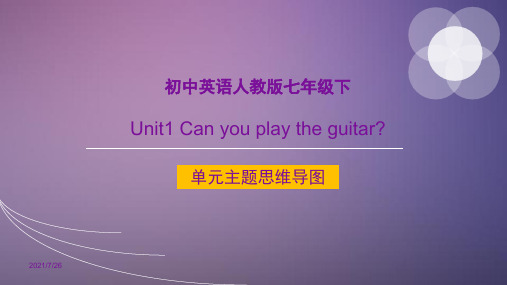
对话篇 SectionA-2d
Lisa: usually take the bus
Jane: How far from…to…
Lisa: takes about 20 minutes How long…? Jane: 15mins by bike
Lisa: have a good day Jane: You, too.
What time/ when引导的 特殊疑问句
2021/7/26
2 询问具体时间时,即几点几分,只能用what time,不能用when。
—What time is it? — It’s seven o’clock.
3 询问年份、月份、日期时,只能用when,不能用what time。
— When is the Music Festival? — It’s on January 2nd.
初中英语人教版七年级下
Unit2 What time do you go to school?
单元主题思维导图
2021/7/26
Daily routines
日常作息习惯
对话篇 Sec2t0io21n/A7/-226d
Interviewer: interesting job Radio station What time…?
他
一般疑问句 Should I open the door? Should+主语+V原+其他?
特殊疑问句 When should we go? 特殊疑问句+should+主语+V原+其
他?
swim, play basketball/ tennis/volleyball
Sports
the Renaissance Period 思维导图英美文学选读

the Renaissance period•time:between the 14th and mid-17th centuries.•it first started in Italy. painting,sculpture and culture.•marks a transition from the medieval to the modern world.•is a movement stimulated by a series of historical events.o the rediscovery of ancient Roman and Greek culture.o the new discoveries in geography and astrology.o the religious reformation and the economic expansion.•in essence,is a historical period in which the European humanist thinkers and scholars made attempts to get rid of those old feudalist ideas in medieval Europe,to introdue new ideas that expressed the interests of the rising bourgeoisie,and to recover the purity of the early church from the corruption of the Roman Catholic Church.•the Renaissance was slow in reaching Englando England's separation from the Continento its domestic unrest.•show its effect in Englando it was not until the reign of Henry VIII(from 1509 to 1547)▪The Oxford reformers,scholars and humanists introduced classicalliterature to England.▪religious reformation from the Continent.▪Martin Luther(1483-1546)a German Protestant,who initiatedthe Reformantion.who believed that every true Christian washis own priest and was entitled to interpret the Bible forhimself.▪the colorful and dramatic ritual of the CatholicChurch was simplified.Indulgences,pilgrimages andother practices were condemned.▪in the early stage of the continental Reformantion,he was regardedas a faithful son of the Catholic Church and named "Defender of theFaith",by the pope.▪his need for a legitimate male heir,and hence a new wife,led him tocut ties with Rome.the common english people had long beendissatisfied with the corruption of the church and inspired by thereformers'ideas from the Continent.▪1534,he was the Supreme Head of the Church of England,▪Bible in English was placed in every church andservices were held in English instead of Latin.so thatpeople could understand.▪Edward VI,Henry's son, the reform of the church's doctrine andteaching was carried out▪After Mary ascended the throne ,there was a violent swing toCatholicism▪by the middle of Elizabeth's reign,Protestantism had been firmlyestablished,with a certain extent of compromise between Catholicismand Protestantism.•had no sharp break with the past,Attitudes and feelings which had been characteristic of the 14th and 15th centuries persisted well down into the era of Humanism and Reformation.•Humanism is the essence of the Renaissance.o it sprang from the endeavor to restore a medieval reverence for the antique authors and is frequently taken as the beginning of the Renaissance on itsconscious,intellectual side,for the Greek and Roman civilization was based onsuch a conception that "man is the measure of all things"o Renaissance humanists found in the classics a justification to exalt human nature and came to see that human beings were glorious creatures capableof individual development in the direction of perfection,and that the worldthey inhabited was theirs not to despise but to question,explore,andenjoy.Thus ,by emphasizing the dignity of human beings and the importanceof the present life,they voiced their beliefs that man did not only have theright to enjoy the beauty of this life,but had the ability to perfect himself andto perform wonders.o Humanism began to take hold in England when the Dutch scholar Desiderius Erasmus(1466-1536) came to teach the classical learning,first at Oxford andthen at Cambridge.o Thomas More,Christopher Marlowe,William Shakespeare are the best representatives of the English humanists.•Strong national feeling in the time of the Tudors gave a great incentive to the cultural development in England.o English schools and universities were established in place of the old monasteries.with classical culture and the Italian humanistic ideas coming intoEngland,the English Renaissance began flourishing.o William Caxton,for he was the first person who introduced printing into England.▪printed Chaucer's "The Canterbury Tales" and Malory's "Morte Darthur".▪with the introduction of printing, an age of translation came into being.▪Plutarch's"Lives of the Noble Grecians and Romans" wastranslated by North.▪Ovid's"Metamorphoses" by Golding▪Homer's "The Iliad" by Chapman▪Montaigne's"Essays" by Florio.•The first period of the English Renaissanc was one of imitation and assimilation.o Academies after the Italian type were founded.o Petrarch was regarded as the fountainhead of literature by the English writers.▪he and his successors who established the language of love and sharply distinguished the love poetry of the Renaissance from itscounterparts in the ancient world.▪Wyatt and Surrey began engraving the forms and graces of Italian poetry upon the native stock.▪Wyatt introduced the Petrarchan sonnet into England.▪Surrey brought in blank verse.▪Sidney followed with the sestina and terza rima and withvarious experiments in classic meters.▪Marlowe gave new vigor to the blank verse with his "mightylines"▪"The Passionate Shepherd to His Love", innocent.o Spenser's "The Shepheardes Calender" pastoral.•in the early stage of the Renaissance,poetry and poetic drama were the most outstanding literary forms.o they were carried on especially by Shakespeare and Ben Jonson.o The Elizabethan drama is the real mainstream of the English Renaissance.▪Lively,vivid native English material was put into the regular form of the Latin comedies of Plautus and Terence,Tragedies were in the styleof Seneca.▪the most famous dramatists in the Renaissance England are Christopher Marlowe,William Shakespeare,and Ben Jonson. •Francis Bacon(1561-1626) the first important English essayist,he was also the founder of modern science in England.•VIP Writerso William Shakespeare(1564-1616)▪playwright and poet.with his 38 plays,154 sonnets and 2 long poems.▪born into a merchant's family in Stratford-on-Avon.his father,John Shakespeare,his wife Anne Hathaway gave birth to threechildren:Susanna,and the twins,Judith and Hamnet.1586 or 1587 heleave home to London.▪he worked as actor and playwright in King's Men,Robert Greene,"University Wits" declared him to be" an upstart crow"▪ 2 long narrative poems,"Venus and Adonis" and "The Rape of Lucrece",they were dedicated to the Earl of Southampton.(1593-1594) ▪his dramatic career is divided into four periods.▪the first period- one of apprenticeship.▪five history plays:"Henry VI,Parts I,II,and III" "RichardIII" and "Titus Andronicus"; four comedies:"TheComedy of Errors" "The Two Gentlemen of Verona""Taming of the Shrew" "Love's Labour's Lost"(5,4,0)▪second period-style and approach became highlyindividualized.▪five histories: "Richard II" "King John" "Henry IV,PartsI and II" "Henry V"; six comedies:"A MidsummerNight's Dream" "The Merchant of Venice" "Much AdoAbout Nothing" "As You Like It" "Twelfth Night" "TheMerry Wives of Windsor"; two tragedies:"Romeo andJuliet" "Julius Caesar"(5,6,2)▪third period-greatest tragedies and his so-called dark comedies.▪two comedies:"All's Well That Ends Well" "Measurefor Measure": seven tragedies:"Hamlet" "Othello""Macbeth" "King Lear" "Antony and Cleopatra""Troilus and Cressida" "Coriolanus"(0,2,7)▪last period-romantic tragicomedies and two final plays.▪four romantic tragicomedies:"Pericles" "Cymbeline""The Winter's Tale" "The Tempest"; two finalplays:"Henry VIII" "The Two Noble Kinsmen".▪prevalent Christian teaching ofatonement.he seems to have entered animagined pastoral world.he could achievewhat he failed to in the real world.▪"The Tempest",the characters areallegorical and the subject full ofsuggestion.the humanly impossibleevents can be seen occurringeverywhere in the play. the wildstrom becomes magic,answeringProspero's every signal.,it is a typicalexample of his pessimistic viewtowards human life and society in hislate years.▪154 sonnets▪1-126 are addressed to a young man,beloved of the poet,of superior beauty and rank but of somewhat questionablemorals and constancy.▪127-152,they involve a mistress of the poet, a mysterious "Dark Lady",who is sensual,promiscuous,and irresistible.▪153-154,they are translations or adaptations of some version of a Greek epigram,and they evidently refer to the hot springsat Bath.▪99,126,154,three exceptions,▪history plays▪mainly written under the principle that national unity under a mighty and just sovereign is a necessity.▪romantic comedies▪an optimistic attitude toward love and youth.▪"The Merchant of Venice" ,praise the friendship between Antonio and Bassanio.to idealize Portia as a heroine of greatbeauty,wit,and loyalty.and to expose the insatiable greed andbrutality of the Jew.▪after centuries' abusing of the Jews,especially theholocaust committed by the Nazi Germany duringthe Second World War,it is very difficult to seeShylock as a conventional evil figure.and manypeople today tend to regard the play as a satire ofthe Christians' hypocrisy and their false standards offriendship and love,their cunning ways of pursuingworldliness and their unreasoning prejudice againstJews.▪romantic tragedy▪"Romeo and Juliet",which eulogizes the faithfulness of love and the spirit of pursuing happiness.though a tragedy,ispermeated with optimistic spirit.▪great tragedies▪each portrays some noble hero,who faces the injustice of human life and is caught in a difficult situation and whosefate is closely connected with the fate of the whole nation.each hero has his weakness of nature.▪"Hamlet",the melancholic scholar-prince,faces thedilemma between action and mind,▪base on northernEurope,Denmark,Claudius,his father'sbrother,who murdered his father,taken bothhis father's throne and widow.By revealingthe power-seeking,the jostling for place,thehidden motives.the courteous superficialitiesthat veil lust and guilt,Shakespearecondemns the hypocrisy and treachery andgeneral corruption at royal court.▪"Othello",his inner weakness is made use of by theoutside evil force.▪"King Lear",who is unwilling to totally give up hispower makes himself suffer from treachery andinfidelity;▪he has shown to us the two-foldeffects,exerted by the feudalist corruptionand the bourgeois egoism,which havegradually corroded the ordered society.▪"Macbeth" ,his lust for power stirs up his ambitionand leads him to incessant crimes.▪selected reading▪sonnet 18▪is one of the most beautiful sonnets written byShakespeare,in which he has a profound meditationon the destructive power of time and he eternalbeauty brought forth by poetry to the one he loves.Anice summer's day is usually transient,but the beautyin poetry can last for ever.Thus Shakespeare has afaith in the permanence of poetry.▪"The Merchant of Venice"▪An impoverished young Venetian,Bassanio,asks hisfriend, Antonio,for a loan so that he might gain inmarriage the hand of Portia,a rich and beautifulheiress of Belmont.Antonio's money is all invested inmercantile expeditions;in order to help Bassanio hehas to borrow from Shylock,the Jewishusurer.Shylock has made a strange bond thatrequires Antonio to surrender a pound of his flesh ifhe fails to repay him within a certain period of time.▪"Hamlet"▪to live on in this world or to die;to suffer or to takeaction.o John Milton(1608-1674)▪born in London,his father was both a scholar and a cated at St.Paul's School and Cambridge.1638 travelon the Continent.▪he once had an ambition to write an epic which England would "not willingly let die",but the English Revolution broke out his dream.hewas entirely occupied with the thoughts of fighting for humanfreedom.1649,he was appointed Latin Secretary to Cromwell'sCouncil of State. 1652,blind because strains.after the restoration ofCharles II,he was imprisoned for a short time and then retired toprivate life.▪"Paradise Lost" was finished in 1665,after 7 years' labor in darkness.▪"Paradise Regained",1666 started,▪"Samson Agonistes",1671,last important work.the most powerful dramatic poem on the Greek model.▪three groups▪the early poetic works▪"Lycidas"(1637),composed for a collection of elegiesdedicated to Edward King,a fellow undergraduate ofMilton's at Cambridge,who was drowned in the IrishSea.▪the middle prose pamphlets▪"Areopagitica"(1644) is probably his mostmemorable prose work.it is a great plea for freedomof the press.rather smooth and calm.▪the last great poems▪after the Restoration in 1660,when he was blind and suffering,and when he was poor and lonely,Miltonwrote his three major poetical works:▪"Paradise Lost",the only generallyacknowledged epic in English literature since"Beowulf"▪divided into 12 books.taken fromGenesis 3:1-24 of the Bible.thetheme is the "Fall of Man".the poemgoes on to tell how Satan tookrevenge by tempting Adam andEve,the first human beings createdby God,to eat fruit from the tree ofknowledge against God'sinstructions.Eden.intending toexpose the ways of Satan andto"justify the ways of God tomen"and then the tragedy was re-enacted,but with a difference-"Manshall find grace",but he must lay holdof it by an act of free will.thefreedom of the will is the keystone ofMilton's creed.▪"Paradise Regained"▪show how mankind,in the person ofChrist,withstands the tempter and isestablished once more in the divinefavor.▪"Samson Agonistes",is the most perfectexample of verse drama after the Greek stylein English.▪Milton again borrows his story fromthe Bible.but this time he turns to amore vital and personal theme.thewhole poem strongly suggestsMilton's passionate longing that hetoo could bring destruction downupon the enemy at the cost of hisown life.in this sense,Samson isMilton.in his life,Milton showshimself a real revolutionary, a masterpoet and a great prose writer,Hefought for freedom in all aspects asa Christian humanist,while hisachievements in literature make himtower over all the other Englishwriters of his time and exert a greatinfluence over later ones.▪selected reading▪"Paradise Lost"▪the story is taken from the Old Testament.Satan andother angels rebel against God,but they are defeatedand driven from Heaven into Hell.。
英美文学选读 英国文学部分思维导图-高清脑图分享

John Milton Herman Melville
knightly adverntures
popular in the mediecal period
a comprehensive realistic picture of the English society
Chaucer
The Canterbury Tales
154 sonnets 2 long poems
sonnet 18 Venus and Adonis The Rape of Lucrece
His plays are written under the principle that national unity under a mighty and just sovereign is a necessity
seek proportion, unity, harmony and grace in literary expressions
instruct and correct human beings
fixed laws and rules
prose: precise, direct, smooth and flexible poetry: lyrical, epical, didactic, satiric or dramatic
the economic expansion
get rid of old feudalist ideas in medieval Europe
essence
introduce new ideas that expressed the interests of the rising bourgeoisie
Pericles
英美文学欣赏最新版教学课件英国文学Unit 4 Jane Austen
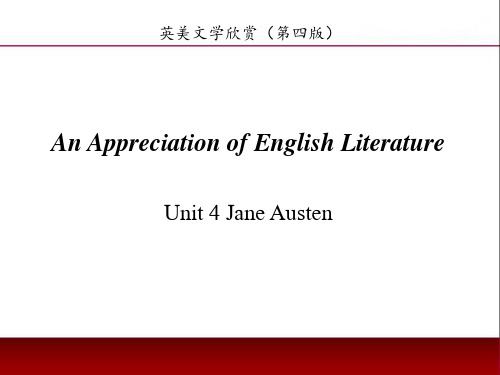
英美文学欣赏(第四版)
You mistake me, my dear. I have a high respect for your nerves. They are my old friends. 你误会了我的意思,我一向对你的神经十分尊重,它已经成了我听惯了的 事。 (注解:这句话的意思是贝内特太太总提起她的神经,贝内特先生已经习 以为常了。)
英美文学欣赏(第四版)
➢ Questions
1.Do you find Mrs. Bennet an amusing character? What is your opinion of her behavior? 2.Who represents pride? Who embodies prejudice? Why? 3.What makes Elizabeth feel so grateful to Darcy? How does Darcy respond to her?
英美文学欣赏(第四版)
Your unexampled kindness to my poor sister 你对我可怜的妹妹的绝无仅有的情谊 (注解:这里指达西为了挽回伊丽莎白家的面子出钱资助韦恩与她 妹妹莉迪亚私奔后成婚之事。)
英美文学欣赏(第四版)
You taught me a lesson,hard indeed at first, but most advantageous. 你给了我一个教训,一开始确实叫人受不了,但无疑是有好处的。 (注解:指伊丽莎白的言行举止以及她对达西的态度让一向傲慢自负 的达西难以接受,但对他确实是有益的教训。)
作品欣赏
这里节选的是第 1 章、第 2 章和 第 58 章。
第 1 章是小说的开场白。第 58 章 在小说情节发展上是个转折点。在此前 的第 56 章中,达西的姨妈凯瑟琳夫人 (Lady Catherine)听说达西追求伊丽莎 白后大怒,亲自跑来阻止,结果反而使 伊丽莎白加深了对达西的了解,最终加 速了两人结合的进程。这里选录的 58 章便是描写两人消除误解,言归于好时 的情景。选文结构清晰,文笔流畅。
英语阅读思维导图
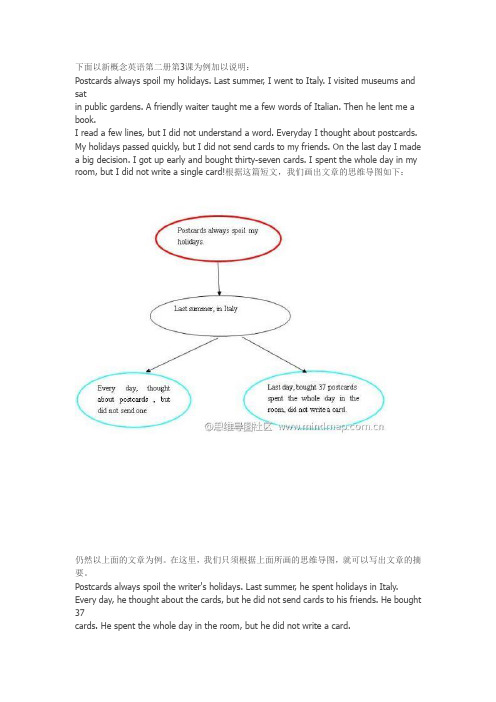
下面以新概念英语第二册第3课为例加以说明:Postcards always spoil my holidays. Last summer, I went to Italy. I visited museums and satin public gardens. A friendly waiter taught me a few words of Italian. Then he lent me a book.I read a few lines, but I did not understand a word. Everyday I thought about postcards. My holidays passed quickly, but I did not send cards to my friends. On the last day I made a big decision. I got up early and bought thirty-seven cards. I spent the whole day in my room, but I did not write a single card!根据这篇短文,我们画出文章的思维导图如下:仍然以上面的文章为例。
在这里,我们只须根据上面所画的思维导图,就可以写出文章的摘要。
Postcards always spoil the writer's holidays. Last summer, he spent holidays in Italy. Every day, he thought about the cards, but he did not send cards to his friends. He bought 37cards. He spent the whole day in the room, but he did not write a card.经过这样的训练,你在阅读时就会很快抓住文章的脉络,掌握其关键要点,正确回答问题。
七年级下册英语第18课思维导图一只狮子的故事

七年级下册英语第18课思维导图一只狮子的故事Long, long ago, there lived a lazy little lion, his diligent brother, and his parents in the forest.One day, his mother said angrily to the little lion: you can't be so lazy, otherwise I won't transfer the position of the heir of the king of beasts to you. Diligence is what we should have to become the king of beasts.The little lion said don't always take the throne of the king of beasts and oppress me. It's a big deal that I won't be the heir.So the mother lion left angrily. The little lion didn't apologize.In the twinkling of an eye, the little butterfly flew over and asked the little lion, "why don't you help your mother?"?The little lion said proudly that where can I help? She will handle it by herself!Mother butterfly waited for the little butterfly to come back for dinner, but it hadn't come back yet, so mother butterfly went out to find it. Found it at the little lion's home, butterfly's mother asked little butterfly: Why are you here? Don't you know it's a famous lazylion? You may learn from him!Ah! It turned out to be the lazy lion! oh dear! How can I talk to this famous lazy lion!When the little lion heard them say so, his face turned red with anger and roared. The butterfly was so frightened that it flew away like an arrow.The little lion came home and made a lot of noise, saying: since some animals dare to scold me for being lazy.You are lazy, but you can still say that others say you are lazy. Mother said angrily.The little lion thought to himself: now the animals ignore me. I must make everyone look at me with new eyes. In the future, I will practice hard, help my mother, do more housework and help other small animals. If I work hard, others won't say I'm lazy. I want to be the real king of beasts.So the little lion became diligent. Mother also looked at it with new eyes. The little lion finally became the king of beasts, and the animals also liked it.The little lion finally understood: everyone likes diligent animals!在很久很久以前,在森林里住着一只懒惰的小狮子,和他勤奋的哥哥,还有它的爸爸妈妈。
